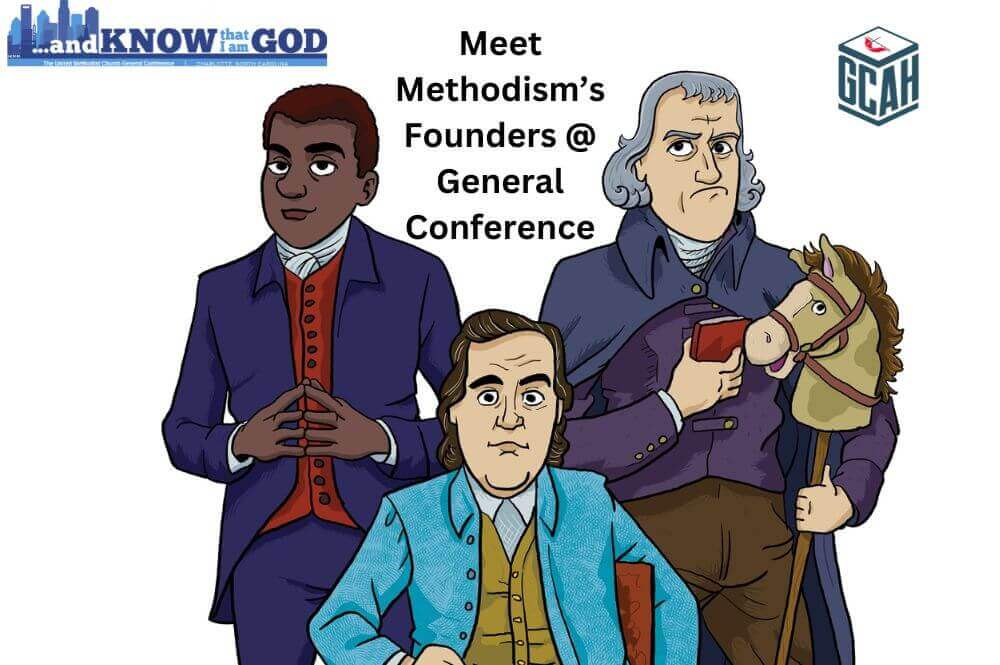Six early founders of Methodism will be featured at the General Commission on Archives and History booth during General Conference 2020 held April 23-May 3, 2024, at Charlotte, N.C.
Attendees to the booth will have an opportunity to take a selfie with life-sized versions of key leaders of the denomination on both sides of the Atlantic Ocean, including the Wesleys, Harry Hosier, Philip William Otterbein and Francis Asbury.
While at the booth, attendees will be asked to offer names of additional founders, particularly outside of the US/England narrative. Think of it as assembling a worldwide Methodism Who's Who!
Learn more about each featured leader below:
Susanna Wesley
It's been said that without Susanna Wesley, there would be no John and Charles. The Wesley matriarch reared her children with an emphasis on loving learning and loving God.
John Wesley
John Wesley, the son of Samuel and Susanna Wesley, is known as the founder of Methodism. Born in England and educated at Oxford University, Wesley professed a faith that was personal and available to everyone. His sermons challenged the Church of England and he and his followers created a movement that served the poor and disenfranchised. He traveled thousands of miles on horseback during his lifetime, which grew the Methodist movement throughout England, first, then to America, and eventually, around the world.
Charles Wesley
Charles Wesley is known as a hymn writer, but he, too, was vital to the founding of Methodism. While his brother, John, wrote sermons, Charles wrote poems and hymns to accompany the services. Among the thousands of hymns he wrote are some of the most memorable and beloved hymns of the Christian church, including “O, For a Thousand Tongues to Sing,” “Love Divine, All Loves Excelling,” and “Hark! the Herald Angels Sing.”
Francis Asbury
Born in England, Francis Asbury sailed to America in 1771 in response to John Wesley’s call for missionaries. He spent the rest of his life traveling thousands of miles on horseback, spreading Methodism from cities to remote frontier settlements. He was elected a bishop of the Methodist Episcopal Church at its organization in 1784, and in many ways was the architect of the American Methodist movement.
Harry Hosier
“I really believe he is one of the best preachers in the world,” was the opinion of Thomas Coke, who, along with Francis Asbury, was one of American Methodism’s first two bishops. “There is such an amazing power attends his preaching, though he cannot read; and he is one of the humblest creatures I ever saw.”
While exact dates are unknown, Hosier experienced Christian conversion at some point and became Asbury’s traveling companion. Soon he began to exhort after the sermon, urging the listeners to apply the preacher’s words to their lives. Later, he was the principal speaker at services.
Philip William Otterbein
In 1968, a merger occurred between The Methodist Church and the Evangelical United Brethren Church (E.U.B.) to form The United Methodist Church. Of the branch of the denomination that was the E.U.B., Philip William Otterbein is one of the early founders.
Otterbein was a German-American clergyman and founder of the United Brethren in Christ. After pastoral work in Germany, he came to America in 1752 as a missionary of the German Reformed Church in Lancaster County, Pennsylvania.
In association with Martin Boehm, whom he met about 1768, he carried on successful evangelistic work, mainly in the German settlements of Pennsylvania and Maryland. His influence was widespread, especially after he became pastor of an independent congregation in Baltimore known as the Evangelical Reformed Church.
While remaining a member of the German Reformed Church, Otterbein played a leading role with Martin Boehm and a small group of lay preachers in laying the foundations in 1789 of a denomination to be known as the United Brethren in Christ; he and Boehm were elected bishops in 1800.

